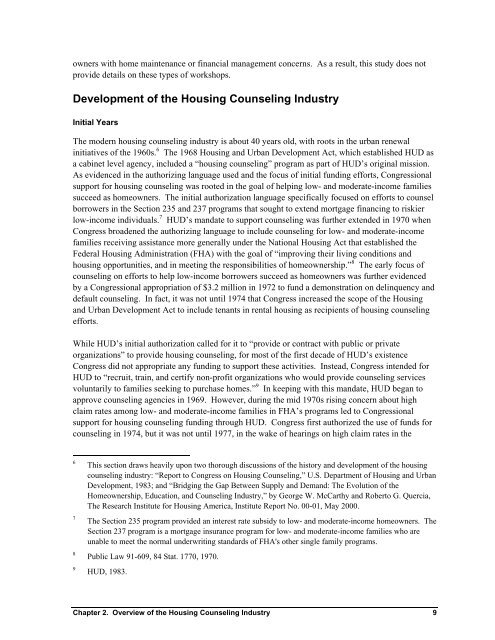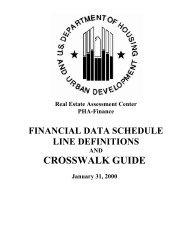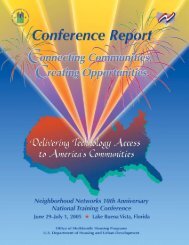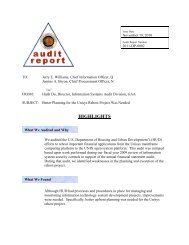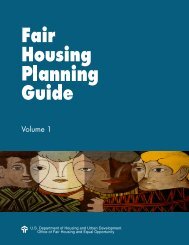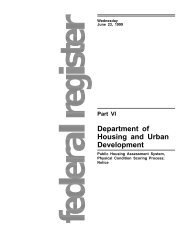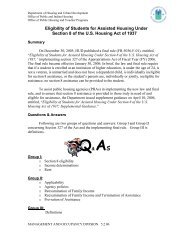Housing Counseling Process Evaluation and Design of ... - HUD User
Housing Counseling Process Evaluation and Design of ... - HUD User
Housing Counseling Process Evaluation and Design of ... - HUD User
Create successful ePaper yourself
Turn your PDF publications into a flip-book with our unique Google optimized e-Paper software.
owners with home maintenance or financial management concerns. As a result, this study does not<br />
provide details on these types <strong>of</strong> workshops.<br />
Development <strong>of</strong> the <strong>Housing</strong> <strong>Counseling</strong> Industry<br />
Initial Years<br />
The modern housing counseling industry is about 40 years old, with roots in the urban renewal<br />
initiatives <strong>of</strong> the 1960s. 6 The 1968 <strong>Housing</strong> <strong>and</strong> Urban Development Act, which established <strong>HUD</strong> as<br />
a cabinet level agency, included a “housing counseling” program as part <strong>of</strong> <strong>HUD</strong>’s original mission.<br />
As evidenced in the authorizing language used <strong>and</strong> the focus <strong>of</strong> initial funding efforts, Congressional<br />
support for housing counseling was rooted in the goal <strong>of</strong> helping low- <strong>and</strong> moderate-income families<br />
succeed as homeowners. The initial authorization language specifically focused on efforts to counsel<br />
borrowers in the Section 235 <strong>and</strong> 237 programs that sought to extend mortgage financing to riskier<br />
low-income individuals. 7 <strong>HUD</strong>’s m<strong>and</strong>ate to support counseling was further extended in 1970 when<br />
Congress broadened the authorizing language to include counseling for low- <strong>and</strong> moderate-income<br />
families receiving assistance more generally under the National <strong>Housing</strong> Act that established the<br />
Federal <strong>Housing</strong> Administration (FHA) with the goal <strong>of</strong> “improving their living conditions <strong>and</strong><br />
housing opportunities, <strong>and</strong> in meeting the responsibilities <strong>of</strong> homeownership.” 8 The early focus <strong>of</strong><br />
counseling on efforts to help low-income borrowers succeed as homeowners was further evidenced<br />
by a Congressional appropriation <strong>of</strong> $3.2 million in 1972 to fund a demonstration on delinquency <strong>and</strong><br />
default counseling. In fact, it was not until 1974 that Congress increased the scope <strong>of</strong> the <strong>Housing</strong><br />
<strong>and</strong> Urban Development Act to include tenants in rental housing as recipients <strong>of</strong> housing counseling<br />
efforts.<br />
While <strong>HUD</strong>’s initial authorization called for it to “provide or contract with public or private<br />
organizations” to provide housing counseling, for most <strong>of</strong> the first decade <strong>of</strong> <strong>HUD</strong>’s existence<br />
Congress did not appropriate any funding to support these activities. Instead, Congress intended for<br />
<strong>HUD</strong> to “recruit, train, <strong>and</strong> certify non-pr<strong>of</strong>it organizations who would provide counseling services<br />
voluntarily to families seeking to purchase homes.” 9 In keeping with this m<strong>and</strong>ate, <strong>HUD</strong> began to<br />
approve counseling agencies in 1969. However, during the mid 1970s rising concern about high<br />
claim rates among low- <strong>and</strong> moderate-income families in FHA’s programs led to Congressional<br />
support for housing counseling funding through <strong>HUD</strong>. Congress first authorized the use <strong>of</strong> funds for<br />
counseling in 1974, but it was not until 1977, in the wake <strong>of</strong> hearings on high claim rates in the<br />
6<br />
7<br />
8<br />
9<br />
This section draws heavily upon two thorough discussions <strong>of</strong> the history <strong>and</strong> development <strong>of</strong> the housing<br />
counseling industry: “Report to Congress on <strong>Housing</strong> <strong>Counseling</strong>,” U.S. Department <strong>of</strong> <strong>Housing</strong> <strong>and</strong> Urban<br />
Development, 1983; <strong>and</strong> “Bridging the Gap Between Supply <strong>and</strong> Dem<strong>and</strong>: The Evolution <strong>of</strong> the<br />
Homeownership, Education, <strong>and</strong> <strong>Counseling</strong> Industry,” by George W. McCarthy <strong>and</strong> Roberto G. Quercia,<br />
The Research Institute for <strong>Housing</strong> America, Institute Report No. 00-01, May 2000.<br />
The Section 235 program provided an interest rate subsidy to low- <strong>and</strong> moderate-income homeowners. The<br />
Section 237 program is a mortgage insurance program for low- <strong>and</strong> moderate-income families who are<br />
unable to meet the normal underwriting st<strong>and</strong>ards <strong>of</strong> FHA's other single family programs.<br />
Public Law 91-609, 84 Stat. 1770, 1970.<br />
<strong>HUD</strong>, 1983.<br />
Chapter 2. Overview <strong>of</strong> the <strong>Housing</strong> <strong>Counseling</strong> Industry 9


